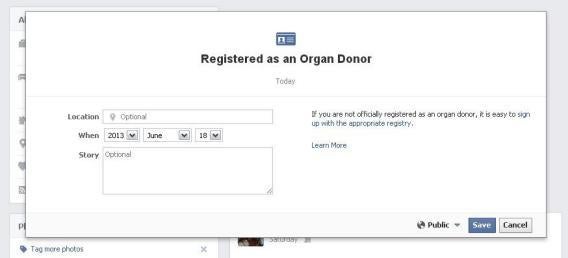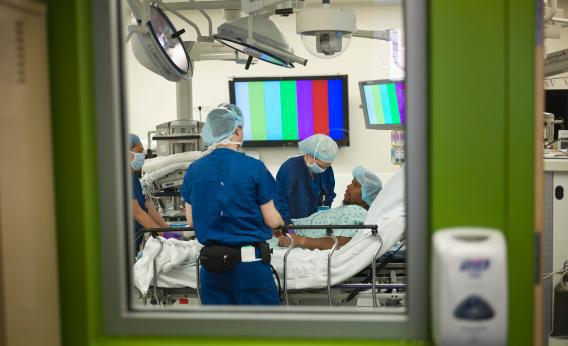It’s easy to overstate the extent to which a social network like Facebook can change the world. It played a role in the Arab Spring, sure, but calling the uprisings there a “Facebook revolution” is a stretch. And with notable exceptions, online activism tends to play a relatively minor role in public policy debates.
That said, there are some specific cases in which Facebook can be used to further a cause more swiftly and on a greater scale than almost any other medium. This is especially true when the goal is to nudge a large number of people to take one specific action for the greater good—one that’s easy enough that it can be done in a matter of minutes, but just annoying enough that a lot of people wouldn’t bother otherwise.
One example is voting. A study last year estimated that a single banner ad on the Facebook news feed, coupled with photos of a user’s friends who had already voted, spurred 60,000 more people to vote in the 2010 midterm elections.
The latest study on Facebook’s potential to promote public welfare might be even more powerful. Seven years ago, Sheryl Sandberg read a profile of her former Harvard classmate Andrew Cameron in the university’s alumni magazine. In the article, Cameron explained how a shortage of donated organs leads to thousands of preventable deaths in the United States every year. So at their 20th reunion in 2011, Sandberg approached Cameron and asked whether Facebook might be able to help. He said he thought that it could.

Screenshot / Facebook
On May 1, 2012, Facebook added an option for users to share their organ-donor status on their timelines. Nearly 60,000 users did so on the first day, a number that gradually tailed off over the following few weeks. Cameron and several colleagues at Johns Hopkins and other public-health institutions followed up with a study in which they examined donor-registration rates in 44 states in the weeks before and after May 1.
They found that 616 people nationwide registered as organ donors online on a typical day before Facebook rolled out the new feature. On May 1, that number spiked to 13,012—21 times the baseline rate. And while registrations declined in the following two weeks, they stayed above the baseline for the duration of the study period, with a two-week total of 39,818 new registrations. In the scrappy, grassroots realm of organ-donation drives, this was a game-changer. The study was published today in the American Journal of Transplantation.
The shortage of donated organs, Cameron told me, is not a medical problem but a social problem. “If you poll the public, as Gallup did in 2005, you will get 95 percent of Americans saying they support donations,” he said. “Yet only about 45 percent have signed up. There’s some obstacle, some barrier, that prevents people from doing it. Having it be on Facebook makes it easier for people—it allows them to do the right thing.”
That seems exactly right. Organ donation is something that people know they ought to do for the good of others, but there’s little individual incentive. The frisson of good feeling that comes from having all your Facebook friends see and like your good deed can help fill that gap.
The next step will be to see whether the gains in donor registration from the introduction of the Facebook feature can be sustained over time. Cameron said he’s working on that. One idea is to try to make it easier for people to instantly share their status change on Facebook when they register as a donor at the DMV. (In the study, while online registrations soared after May 1, registrations at the DMV were basically flat.) Cameron told me he’s also working with software engineers to develop an app that would connect people in need of donations with others in their social network who could serve as donors.
How many lives Facebook saved by adding its organ-donation feature won’t be known for decades. Many registered donors won’t turn out to be actual donors for lack of a match. On the other hand, a single donor could potentially save more than one life by giving more than one organ. Facebook may not always be a force for good, but Cameron’s study is the latest proof that it can be if deployed wisely.
